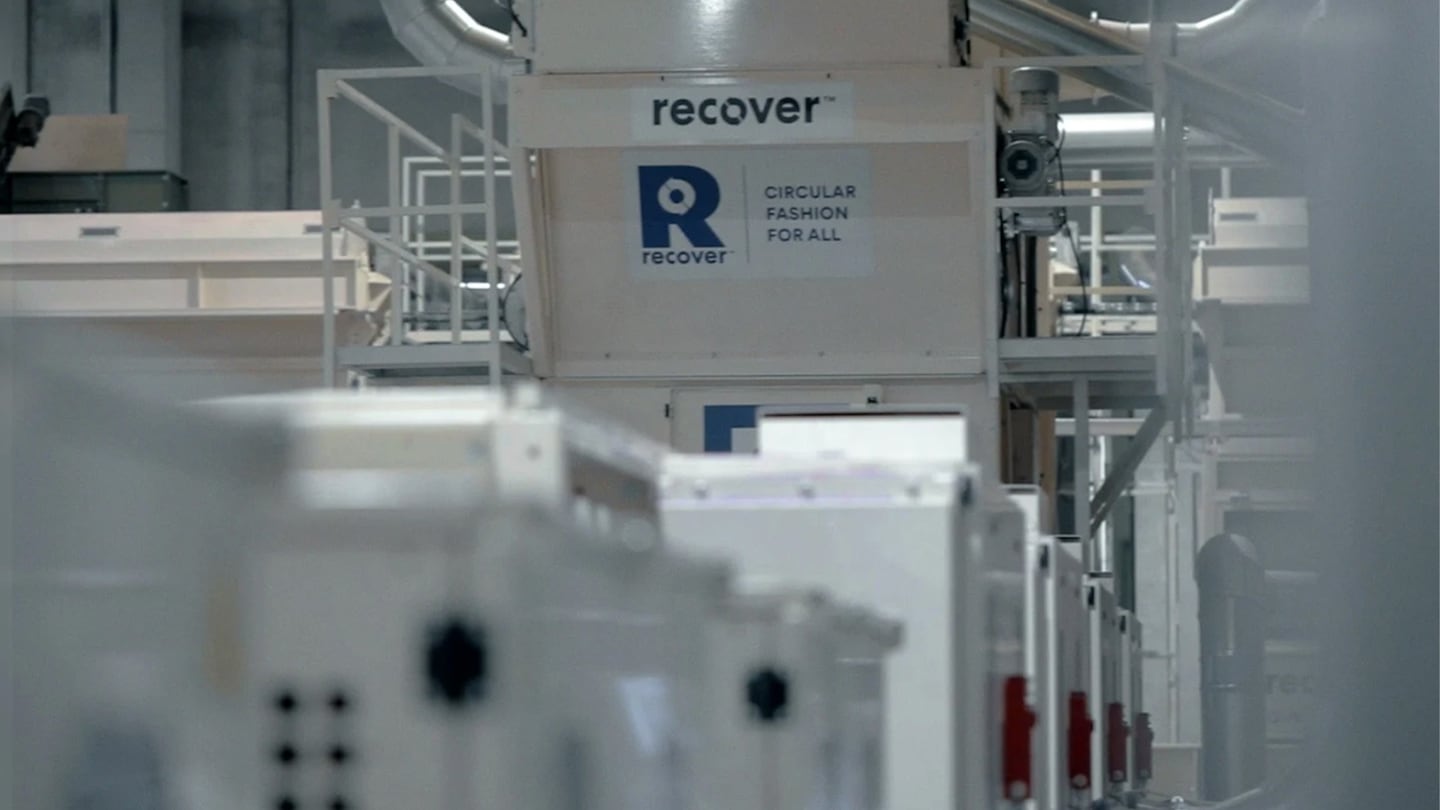
The Business of Fashion
Agenda-setting intelligence, analysis and advice for the global fashion community.

Agenda-setting intelligence, analysis and advice for the global fashion community.

Recover, the Valencia, Spain based producer of recycled cotton fibre and cotton fibre blends for many major fashion brands, has closed a $100 million minority equity investment led by Goldman Sachs Asset Management and existing investor STORY3 Capital Partners. The new funding values the company at $1.1 billion, according to sources close to the deal.
Recover has been supplying low-impact cotton to brands such as Revolve, Primark and Zara-owner Inditex in recent years — often for one-off collections — but had been looking for new capital to scale its production, become a brand in its own right and help fashion purveyors make larger strides in reducing their climate impact.
“I think one of the ingredients for this solution is capital, yes, we need to grow … But part of the secret is that we have to be a visible company,” said Alfredo Ferre, Recover’s chief executive officer. “We have to be able to supply to big companies a certain volume or else they would never be able to work with our fibres.”
While Recover has been around for more than 75 years, the company has more recently attracted greater investments — including an undisclosed sum from STORY3 in 2020 — as demand for recycled materials grows and more fashion brands look to engage with suppliers to source low-impact wares.
ADVERTISEMENT
The investment, the company said, puts it on track to increase its production to over 350,000 metric tons of recycled cotton fibre per year by 2026 — from about 80,000 metric tons in 2023. It will allow the company to add 15 manufacturing facilities in seven geographies, including Vietnam. It already has factories in Bangladesh, Pakistan and Spain.
“We need to be conducting our activities where the waste is being created,” said Peter Comisar, founder and chief executive of STORY3 and former partner at Goldman Sachs. “We need to be in Bangladesh where most of the cotton t-shirts and products are being made and we need to collect waste there as well as recycle it and turn it back into cotton fibre.”
Many of Recover’s clients, including Primark and Revolve, have already publicly espoused some of their sustainability ambitions. Primark, for instance, said in September that all of its clothing will be made from recycled or “sustainably sourced” materials by 2030. Revolve collaborated with Recover for a limited edition collection in October and has been using badges on its website to help customers find responsibly-made products.
But both brands — which represent opposing ends of the pricing spectrum with Primark selling t-shirts for as low as $3.50, while Revolve’s offerings can reach into the thousands of dollars — say they view Recover’s new funding as a critical step in advancing the industry’s goals and helping integrate recycled materials into mainstream production.
“The first stage was introducing the product to the consumer and the products sold well, but I think this could be the type of thing that could be expanded,” said Michael Mensa, Revolve’s co-chief executive officer. “Time will tell if [Recover’s efforts] end up being a watershed moment for the industry as a whole, but I think it definitely has the potential to be really that tipping point.”
Cotton accounts for about 50 percent of the materials used in Primark’s apparel, said Juan Chaparro, the company’s group director of supply chain, sourcing and quality. While Primark has its own initiative called the Sustainable Cotton Programme — through which it promises to train 275,000 smallholder cotton farmers in more sustainable farming methods by the end of 2023 — Chaparro said the bulk of its efforts had initially “missed the circularity piece.”
“To be truly sustainable, you have to have a relevant circular piece in your sustainable portfolio,” he said. “And it’s impossible to do this alone … that’s wishful thinking. So, we need to find the ‘ingredient brands,’ that help us be a part of the solution instead of simply being a part of the problem.”
Recover partner Inditex was among the 30 companies analysed in this year’s BoF Sustainability Index, which rates brands in areas such as waste, materials, emissions and supply chain transparency. The company, which owns Zara, scored 40 out of 100, an above-average ranking but a far cry from the maximum allotted points, underscoring the work that remains across the broader industry. (No company scored more than 49 points on the Index.)
“There’s a huge total addressable market for cotton, obviously, and what we’re doing, unfortunately, will still only be a small percentage of that,” said Comisar. “So there’s a huge football field ahead of us in terms of growing and scaling the business but what we’ve done puts us in the place where we’re going to have a very substantial global platform for production.”
Europe’s Parliament has signed off rules that will make brands more accountable for what happens in their supply chains, ban products made with forced labour and set new environmental standards for the design and disposal of products.
Fashion’s biggest sustainable cotton certifier said it found no evidence of non-compliance at farms covered by its standard, but acknowledged weaknesses in its monitoring approach.
As they move to protect their intellectual property, big brands are coming into conflict with a growing class of up-and-coming designers working with refashioned designer gear.
The industry needs to ditch its reliance on fossil-fuel-based materials like polyester in order to meet climate targets, according to a new report from Textile Exchange.